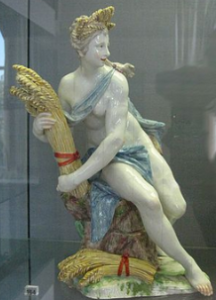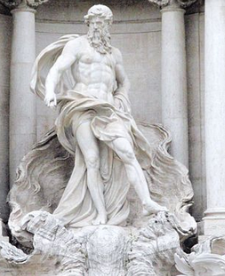Wotcher!
We use many, many different words every day. But did you know that many of them come from mythology? Today, we’ll look at those.
First, my favorite,
Cereal
This is one of my favorite words. A tasty, nutritious breakfast food, which can also refer to certain kinds of grains. But what is its etymology?
Well, it entered into English from the French word “Céréale” meaning “Cereal”, in every sense of the word. It goes deeper than that, however.
The French word is derived from the Latin “Cereālis” meaning “Of corn” or “Implements for grinding corn and preparing it for food”. Ah, but of course, these are only secondary meanings; the primary meaning of this word is “Of Ceres”, “Relating to Ceres” or “Fit for Ceres”. This word is in turn derived from the word “Cerēs”. But who is Ceres?
Ceres is the Roman goddess of agriculture, grain, grain crops, corn, wheat, and bread, and as such is often depicted holding one of these things, as seen above. Of course, since she controlled all of these things, what better deity to name a breakfast food after? And coincidentally, her festival was called “Cerealia”.
Narcissism/Narcissist
Okay, these words aren’t really all that awesome, but they’re from mythology, so…
Narcissism- extreme, inordinate love for oneself, an obsession with one’s appearance, or sexual desire of one’s own body. Who the heck could this have been named for?
The answer- Narcissus (Νάρκισσος, Nárkissos).
Narcissus was a proud and vain Greek youth who spurned those who loved them. One of those he spurned included the nymph, Echo. The Greek goddess of revenge and retribution against humans with hubris (lack of humility before the gods), Nemesis, learning of this story, lured the boy to a pool of water which reflected his image to him. Not realizing it was a reflection, and thinking it was a whole ‘nother person, he fell in love with the reflection.
There are a few divergences as to what happens next. The one I first knew states that he stayed by the pool so long that he starves to death. There is another variant where he accidentally drowns. The most common version has the young lad commit suicide because he realizes that his love is unfulfilled. No matter what happens, he ends up dying in some horrible way.
Thus was the term “narcissism” created, and now you know why it has such a pejorative meaning. I mean, this guy was a real jerk. Anyway, less significantly, upon the death of Narcissus, he was supposed to have changed into a flower, appropriately named the Narcissus.
Mute
A note- no one has actually said explicitly that the mythological element has a part to play in the origin of the word, but there is too much evidence for it not to be true.
Mute- silent speechless, unable to speak. The word comes from Anglo-Norman “Muet” meaning the same thing, as well as Middle French “Muet”. They are both ultimately derived from the Latin word “Mūtus” meaning “Mute”, “Silent”, or “Dumb”.
But what people fail to take into account is the story of the goddess and nymph, Larunda, better known as Mūta. Y’see, Larunda was very beautiful (as all nymphs were, of course), but she was…quite loquacious. Y’know, very garrulous. I mean, she just wouldn’t shut up. What I’m trying to say is, Larunda would not stop talking- like, ever. She was so talkative that she tended to tell secrets a lot.
Once, one of these secrets had to do with the god Jupiter’s affair with the nymph Juturna (the wife of the god Janus). Larunda revealed the affair to Juno, Jupiter’s wife. For betraying his trust, Jupiter “struck her dumb” (read:cut her tongue out) and ordered the god Mercury to take her to what was basically hell. After this, she came to be known as Muta, the goddess of silence.
Echo
Echo- A reflected sound that is heard repeatedly, or to repeat what someone has said.
This word comes from the story of the mountain nymph, Echo (Ἠχώ, Ēkhō). This story is relatively short- Zeus, the king of the gods, loved to “consort with” (read: cheat on his wife with) beautiful nymphs, and often visited them on Earth.
When Zeus’ wife, Hera, became suspicious and attempted to catch Zeus, Echo attempted to take up for Zeus, and protect him, distracting Hera with long conversations. Because Echo got in her way, Hera cursed her to lose her voice, and only be able to say the last few words said to her. Because of this, when she met Narcissus while he was lost, and fell in love with him, she was unable to express her feelings for him, was forced to repeat his cry of “Is there anyone there?”, and was forced to watch him fall in love with his reflection, and subsequently die. Following that incident, Echo wasted away, and all that remained was the sound of her voice.
Jeez! You don’t screw with Hera! She will screw your life up!
Music
This is derived from the Old French word “Musique”, meaning “Music”, which came from the Latin “Mūsica”, meaning same. This word is derived from the Latin “Mūsa” meaning “Muse”. What is a Muse?
In Greek mythology (later adopted by the Romans), there were nine goddesses of inspiration. They inspired science, literature, and the arts. Of course, music is one of the fine arts, so there you go.
Other derivatives of “Muse” include “museum”, from a Latin transliteration of the Greek “Mouseíon” (Μουσεῖον) meaning “Shrine of the Muses”, and of course, the word “Muse” as a loanword (rather obvious), and “muse” meaning “A source of inspiration” or archaically, “a bard or poet”.
Titan/Titanic/Titanium
A titan is something or something that is very large, very powerful, or very godly. And titanic, besides meaning a crappy six-hour-long movie, means having great size or power. Titanium is a very strong, corrosion-resistant metal and chemical element.
This is derived from the Titans.
In Greek mythology, the Titans (Τῑτᾶνες, Tītânes) were a race of twelve divine beings who were very huge and very warlike. Incidentally, in Legend of Zelda: A Link to the Past, this race gets a mention with the “Titan’s Mitt” item, a glove that gives Link superhuman strength. Oh yeah, and ‘Teen Titans“? *Clicks teeth twice and points both fingers*
Ocean
One of five large bodies of water separating the continents.
This is derived from the Latin word “Ōceanus” meaning “The ocean personified as a deity”, which is derived from the Greek “Ōkeanós” (Ὠκεᾰνός).
Oceanus was the divine representation of the sea, and the god of the sea. Incidentally, he was a Titan. Because he was thought to be the originator of the sea, the word “ocean” was coined in honor of him.
Atlas
An atlas is a book with collections of maps and tables, or a book version of the globe. The word is derived from the Latin “Atlas” meaning “The Titan Atlas”. This is further derived from the Greek “Átlās” (Ἄτλᾱς) meaning same.
Atlas was the Titan of strength. In the Titan’s war against the Olympians (which was known as the Titanomachy), most of the Titans were condemned to Tartarus (basically hell), but Atlas wasn’t. Oh no, he got the very special job, from Zeus, of holding up the Heavens and the Earth. For all eternity. This is why in nearly every artwork of him, he is depicted holding the Earth.
People figured the least the could do to honor this Titan’s work was to name a book after him. Crappy reward, if you ask me. That thing’s gotta be heavy. Also, it is safe to say that the concept of the Four Giants of Majora’s Mask were inspired by Atlas, as their roles are similar.
This is all for right now, but there shall be more. Enjoy!







